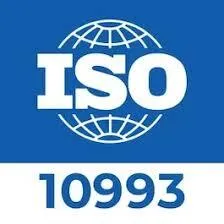ISO 10993: Navigating Biocompatibility Testing for Medical Devices
An Introduction to ISO 10993 Series of Standards
 Medical device manufacturers should always refer to ISO 10993 Series of Standards in addition to region-specific regulatory guidelines (for example, in the US, it is the FDA guidance), when preparing their Premarket Applications (PMAs), Humanitarian Device Exceptions (HDEs), Investigational Device Exemption (IDE) Applications, Premarket Notifications (510(k)s), and De Novo requests for their devices.
Medical device manufacturers should always refer to ISO 10993 Series of Standards in addition to region-specific regulatory guidelines (for example, in the US, it is the FDA guidance), when preparing their Premarket Applications (PMAs), Humanitarian Device Exceptions (HDEs), Investigational Device Exemption (IDE) Applications, Premarket Notifications (510(k)s), and De Novo requests for their devices.
What is the ISO 10993 series and why is it important?
The ISO 10993 standards comprise a set of international standards that address the biological evaluation of medical devices. These standards provide guidelines for assessing the potential risks associated with the use of medical devices. Each standard covers a specific aspect of biocompatibility of the devices, including cytotoxicity, sensitization, irritation, and systemic toxicity. Compliance with the standards ensures that medical devices meet safety and performance criteria, which contributes to the overall quality and reliability of healthcare products. Below is a list of all the relevant standards for biocompatibility of medical devices and a short summary of their importance.
- ISO 10993-1: Evaluation and testing within a risk management process: (latest 2020)
This standard serves as an introduction to the ISO 10993 series, providing an overview of the biological evaluation of medical devices. It sets the foundation for subsequent parts, outlining general principles and considerations. - ISO 10993-2: Animal welfare requirements: (latest 2022)
This standard guides the ethical treatment of animals in biocompatibility testing for medical devices. It emphasizes minimizing discomfort and ensuring humane practices during testing procedures. - ISO 10993-3: Tests for genotoxicity, carcinogenicity, and reproductive toxicity: (latest 2014)
Addressing potential long-term risks, this standard outlines testing methods to evaluate genotoxic, carcinogenic, and reproductive effects associated with the use of medical devices. - ISO 10993-4: Selection of tests for interactions with blood: (latest 2017)
Specifically tailored for devices in contact with blood, this standard provides criteria for selecting tests to assess the interactions between medical devices and blood components. - ISO 10993-5: Tests for in vitro cytotoxicity: (latest 2009)
Focused on cellular response, this standard details procedures for in vitro cytotoxicity testing, ensuring that medical devices do not induce harmful effects on cells. - ISO 10993-6: Tests for local effects after implantation: (latest 2016)
Addressing local effects post-implantation, this standard guides the evaluation of tissue responses to medical devices, emphasizing the importance of assessing biocompatibility at the implantation site. - ISO 10993-7: Ethylene oxide sterilization residuals: (latest 2008)
Centered on sterilization methods, this standard focuses on ethylene oxide residuals, ensuring that medical devices treated with this method meet safety standards regarding residual levels. - ISO 10993-9: Framework for identification and quantification of potential degradation products: (latest 2019)
Addressing potential degradation, this standard establishes a framework for identifying and quantifying degradation products, ensuring the safety and efficacy of medical devices over time. - ISO 10993-10: Tests for skin sensitization: (latest 2021)
Focusing on skin irritation and sensitization, this standard outlines testing methods to assess the potential for medical devices to cause skin-related adverse effects. - ISO 10993-11: Tests for systemic toxicity: (latest 2018)
This standard delves into systemic toxicity testing, ensuring a comprehensive evaluation of medical devices’ impact on the entire organism. It addresses potential adverse effects beyond local responses, contributing to overall safety assessments. - ISO 10993-12: Sample preparation and reference materials: (latest 2021)
Focused on accuracy, this standard provides guidelines for sample preparation and the use of reference materials in biocompatibility testing. It emphasizes consistency and reliability in test procedures. - ISO 10993-13: Identification and quantification of degradation products from polymeric medical devices: (latest 2019)
Tailored for polymeric medical devices, this standard establishes methods for identifying and quantifying degradation products, crucial for ensuring the longevity and safety of such devices. - ISO 10993-14: Identification and quantification of degradation products from ceramics: (latest 2009)
This standard provides guidance on specific tests for the identification and quantification of the degradation products associated with the use of ceramics in medical devices. It ensures the long-term stability and biological safety of ceramic medical devices - ISO 10993-15: Identification and quantification of degradation products from metals and alloys (latest 2023)
This standard is focused on design of tests for identifying and quantifying degradation products from final metallic medical devices or corresponding material samples finished as ready for clinical use. The standard ensures that the degradation products do not pose any unacceptable risks to patients. - ISO 10993-16: Toxicokinetic study design for degradation products and leachables: (latest 2017)
Addressing the toxicokinetic aspects, this standard guides the design of studies focused on degradation products and leachables. It ensures a comprehensive understanding of how these substances interact with the body over time. - ISO 10993-17: Toxicological risk assessment of medical device constituents (latest 2023)
This standard focuses on the toxicological risk assessment of medical device constituents. It ensures that the potential risks associated with the exposure of materials and processes used in manufacturing of the device are thoroughly evaluated. - ISO 10993-18: Chemical characterization of medical device materials within a risk management process: (latest 2023)
Centered on material characterization, this standard provides guidelines for the chemical analysis of materials used in medical devices. It ensures a thorough understanding of the composition and potential risks associated with device materials. - ISO 10993-19: Physico-chemical, morphological, and topographical characterization of materials: (latest 2020)
Expanding on material characterization, this standard includes physico-chemical, morphological, and topographical aspects. It contributes to a comprehensive assessment of how these characteristics influence biocompatibility. - ISO/TS 10993-20: Principles and methods for immunotoxicology testing of medical devices: (latest 2006)
Focused on immunotoxicology, this standard outlines principles and methods for assessing the immunological impact of medical devices. It ensures a thorough evaluation of potential immune system responses to device exposure. - ISO/TR 10993-22: Guidance on nanomaterials: (latest 2017)
This standard provides a general framework for assessing the safety of medical devices made of nanomaterials. It ensures a thorough toxicological evaluation of nanomaterials and their biological safety in medical devices. - ISO 10993-23: Tests for irritation (latest 2021)
This standard is focused on the tests designed to predict and classify the irritation potential of medical devices, materials, or their extracts. It ensures a thorough evaluation of any potential irritation reactions on biological tissues, thereby contributing to the overall safety of medical devices.
(Note: latest were based on Techstreet website accessed in February 2024)
The ISO 10993 standards serve as an indispensable guide for manufacturers, regulatory bodies, and subject matter specialists involved in the development and evaluation of medical devices. By addressing various aspects of biocompatibility testing, these standards reflect a commitment to advancing the quality and reliability of medical devices, ultimately enhancing patient outcomes and safety in the healthcare landscape.
If you would like to know more about ISO 10993 standards and how MED Institute can help your biological evaluation of medical devices, contact us for more information: 855.463.1633 | medinstitute.com.
Get email about news, services, and events from MED Institute.
OUR COMMITMENT
We are committed to consistently performing services with high quality, that deliver exceptional results, and add value to the client’s business.
For client surveys sent since 2024, we received ratings of 4.99/5 (16).

